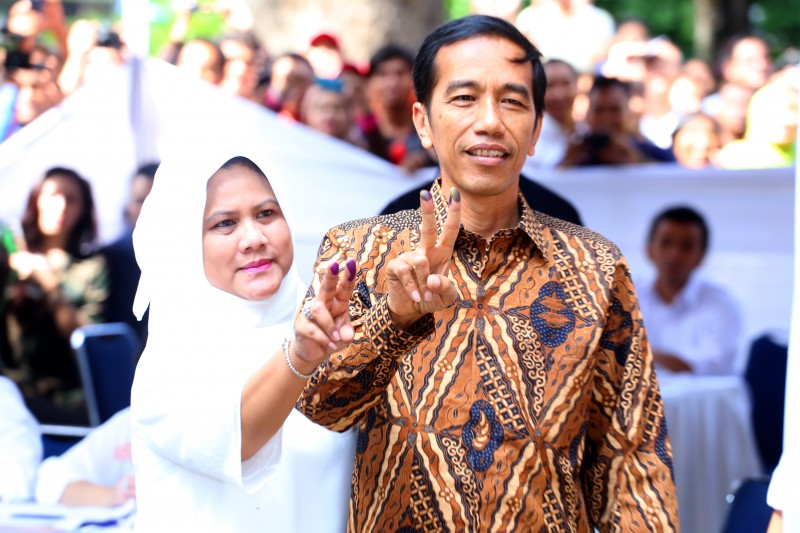 [1]
[1]Jakarta Governor Joko Widodo or Jokowi is Indonesia's president-elect. Photo by Denny Pohan, Copyright @Demotix (7/9/2014)
Indonesia's election officials have declared that Jakarta Governor Joko Widodo [2] (Jokowi), a popular politician from the city of Solo, will be the country's seventh president after completing the vote count [3] late Tuesday.
Widodo, who took 53.15 percent [4] of the nearly 130 million votes cast, is the country's third president to be elected by a direct vote.
Indonesia, the world's third largest democracy, held its presidential elections on July 9. The main candidates were Widodo and Prabowo Subianto, a former military man who is praised as a strong and courageous leader by his supporters, but who has faced accusations of human rights abuses during the three-decade-long rule of authoritarian Suharto [5].
Some Indonesian Twitter users immediately expressed relief and approval over the finalization of the counting:
#PresidenBaru [6] hasil pilpres 2014 akan mensejajarkan Indonesia bersama negara-negara terdepan demokrasi dunia.
— JKW-JK 4 Indonesia (@JKW4Ind) July 22, 2014 [7]
The election result will put Indonesia on par with the world's leading democratic countries.
#PresidenBaru [6] adalah pak @jokowi_do2 [8]…selamat yach pak kami percaya bapak akan membawa perubahan buat Indonesia — NyakBabe (@nyakbabe2) July 22, 2014 [9]
Our new President is Jokowi. Congratulations, we believe that you will bring change to Indonesia.
But earlier today, Subianto announced that he intends to ignore [10] the Indonesia's General Elections Committee [11] (KPU) result. Instead, he said he will mount a legal challenge [12] to protest the alleged fraud in the voting process. However, his running mate Hatta Rajasa has distanced [13] himself from Subianto's decision. Twitter users responded:
Ironic how Prabowo says he's for the people when Suryadharma Ali, a corruption suspect,is standing right behind him in support #PresidenBaru [6] — David Michael Saga (@DMSaga) July 22, 2014 [14]
More like a desperate act from Prabowo, bailing out of the election won't make u win also. This is the voice of the people. #presidenbaru [15]
— MC BLAKE (@jason_blake) July 22, 2014 [16]
Indonesia's stock market reacted negatively after Subianto made his announcement. This reflected the concern of many people about the impact on Indonesia's political stability if one of the candidates, Subianto in particular, rejected the results:
Indonesia Stock Exhange drops 1.5% after Prabowo press conference. #PresidenBaru [6] pic.twitter.com/W8k5rYY2GP [17]
— World News Pulse (@WNPulse) July 22, 2014 [18]
#prabowo [19] asked the supporters to calm down, but he himself is so emotional & his statement may provoke negative movement. #PrabowoKokGitu [20]
— Elya Khoe (@elyakhoe) July 22, 2014 [21]
On his Twitter account, Former Minister of Justice and Human Rights, Professor Yusril Izra Mahendra wrote about what would happen if the presidential election failed:
3. Dlm UU Pilpres sebagaimana dlm UU Pileg dan Pilkada, seorang calon yg sdh disahkan sbg calon tdk boleh mundur dg alasan apapun
— Yusril Ihza Mahendra (@Yusrilihza_Mhd) July 22, 2014 [22]
In the presidential election law, similar to legislative election and provincial election laws, a confirmed candidate isn't allowed to resign, whatever reason he might have.
10. Kalau Pilpres sekarang ini gagal, maka akan terjadi kevakuman pemerintahan, sebab MPR tdk bisa memperpanjang masa jabatan SBY — Yusril Ihza Mahendra (@Yusrilihza_Mhd) July 22, 2014 [23]
If today's president election fails, then there will be an absence of government because the People's Consultative Assembly (MPR) can't extend [current President Susilo Bambang Yudhoyono's] tenure.
11. Kevakuman pemerintahan tsb sangat membahayakan bangsa dan negara, karena itu keselamatan negara harus diutamakanw
— Yusril Ihza Mahendra (@Yusrilihza_Mhd) July 22, 2014 [24]
The government's ‘absence’ will jeopardize the nation and state, therefore the survival of the state remains a priority.
Meanwhile, some Twitter users also acknowledged President Yudhoyono, known by his initials SBY, for his work in maintaining a peaceful democratic transition:
Terimakasih juga Pak SBY yang telah mengawal dan membantu menciptakan pemilu yang aman dan damai :’)
— A G Y L (@AgylDhani) July 22, 2014 [25]
Thank you SBY for assistance in creating a safe and peaceful election.
Widodo will be sworn in as president on Oct. 20, 2014.